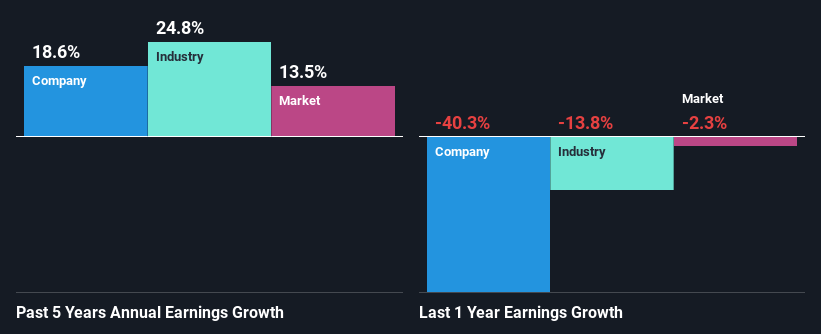Stock Analysis
- United States
- /
- Consumer Durables
- /
- NYSE:TPH
Tri Pointe Homes, Inc.'s (NYSE:TPH) Stock On An Uptrend: Could Fundamentals Be Driving The Momentum?

Tri Pointe Homes' (NYSE:TPH) stock is up by a considerable 7.4% over the past week. We wonder if and what role the company's financials play in that price change as a company's long-term fundamentals usually dictate market outcomes. Specifically, we decided to study Tri Pointe Homes' ROE in this article.
Return on equity or ROE is a key measure used to assess how efficiently a company's management is utilizing the company's capital. Put another way, it reveals the company's success at turning shareholder investments into profits.
View our latest analysis for Tri Pointe Homes
How Do You Calculate Return On Equity?
ROE can be calculated by using the formula:
Return on Equity = Net Profit (from continuing operations) ÷ Shareholders' Equity
So, based on the above formula, the ROE for Tri Pointe Homes is:
12% = US$349m ÷ US$3.0b (Based on the trailing twelve months to December 2023).
The 'return' is the income the business earned over the last year. That means that for every $1 worth of shareholders' equity, the company generated $0.12 in profit.
What Has ROE Got To Do With Earnings Growth?
Thus far, we have learned that ROE measures how efficiently a company is generating its profits. Depending on how much of these profits the company reinvests or "retains", and how effectively it does so, we are then able to assess a company’s earnings growth potential. Assuming everything else remains unchanged, the higher the ROE and profit retention, the higher the growth rate of a company compared to companies that don't necessarily bear these characteristics.
A Side By Side comparison of Tri Pointe Homes' Earnings Growth And 12% ROE
To start with, Tri Pointe Homes' ROE looks acceptable. Even so, when compared with the average industry ROE of 16%, we aren't very excited. Although, we can see that Tri Pointe Homes saw a modest net income growth of 19% over the past five years. Therefore, the growth in earnings could probably have been caused by other variables. Such as - high earnings retention or an efficient management in place. Bear in mind, the company does have a respectable level of ROE. It is just that the industry ROE is higher. So this also does lend some color to the fairly high earnings growth seen by the company.
We then compared Tri Pointe Homes' net income growth with the industry and found that the company's growth figure is lower than the average industry growth rate of 25% in the same 5-year period, which is a bit concerning.

Earnings growth is an important metric to consider when valuing a stock. It’s important for an investor to know whether the market has priced in the company's expected earnings growth (or decline). This then helps them determine if the stock is placed for a bright or bleak future. If you're wondering about Tri Pointe Homes''s valuation, check out this gauge of its price-to-earnings ratio, as compared to its industry.
Is Tri Pointe Homes Efficiently Re-investing Its Profits?
Tri Pointe Homes doesn't pay any dividend, meaning that all of its profits are being reinvested in the business, which explains the fair bit of earnings growth the company has seen.
Conclusion
Overall, we feel that Tri Pointe Homes certainly does have some positive factors to consider. Particularly, its earnings have grown respectably as we saw earlier, which was likely achieved due to the company reinvesting most of its earnings at a decent rate of return, to grow its business. That being so, a study of the latest analyst forecasts show that the company is expected to see a slowdown in its future earnings growth. To know more about the company's future earnings growth forecasts take a look at this free report on analyst forecasts for the company to find out more.
Valuation is complex, but we're helping make it simple.
Find out whether Tri Pointe Homes is potentially over or undervalued by checking out our comprehensive analysis, which includes fair value estimates, risks and warnings, dividends, insider transactions and financial health.
View the Free AnalysisHave feedback on this article? Concerned about the content? Get in touch with us directly. Alternatively, email editorial-team (at) simplywallst.com.
This article by Simply Wall St is general in nature. We provide commentary based on historical data and analyst forecasts only using an unbiased methodology and our articles are not intended to be financial advice. It does not constitute a recommendation to buy or sell any stock, and does not take account of your objectives, or your financial situation. We aim to bring you long-term focused analysis driven by fundamental data. Note that our analysis may not factor in the latest price-sensitive company announcements or qualitative material. Simply Wall St has no position in any stocks mentioned.
About NYSE:TPH
Tri Pointe Homes
Engages in the design, construction, and sale of single-family attached and detached homes in the United States.
Adequate balance sheet and fair value.


